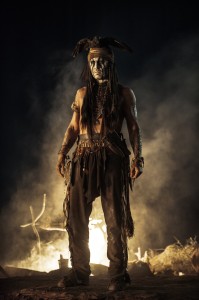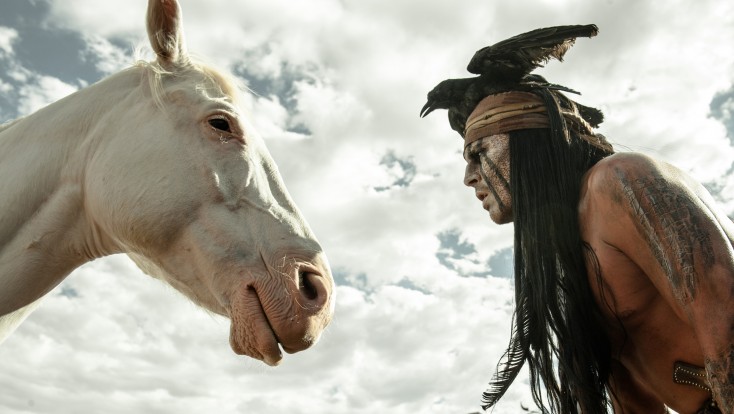
Johnny Depp as Tonto in “THE LONE RANGER.” ©Disney Enterprises/Jerry Bruckheimer Inc. CR: Peter Mountain.
By ANGELA DAWSON
Front Row Features
SANTA FE, N.M.—As a youngster growing up in Kentucky, Johnny Depp would watch reruns of the TV series “The Lone Ranger” in black and white and remembers feeling “perturbed” with the depiction of Tonto (as played by Native American actor Jay Silverheels) as the sidekick.
That just didn’t register properly in my head,” recalls Depp, speaking at a press conference at an upscale resort/lodge here where he is promoting his new movie, a more politically correct update of the western classic where Tonto and The Lone Ranger are equals.
“No disrespect to anybody at all,” continues the popular actor, “certainly not Jay Silverheels, but I just thought (making this movie) was potentially an opportunity to right the wrong.”
“The Lone Ranger” was introduced 80 years ago, first as a radio serial created by Detroit radio station owner George W. Trendle, who wanted a Western that would appeal to children listeners. The character he created was wholesome, honest and an authority figure children could admire. He rode a white horse called Silver and wore a black mask to conceal his identity. Trendle handed the idea to Fran Striker, a scriptwriter from Buffalo, and the station’s staff director, James Jewell. Jewell went on to direct “The Lone Ranger” radio series through 1938, by which time it had become a national phenomenon.
Jewell’s father-in-law owned a camp called Kamp Kee-Mo-Sah-Bee, which became the obvious linguistic inspiration behind Tonto’s name for his friend (kemosabe), the Lone Ranger. Tonto was introduced in the eleventh episode. The TV series followed, starring Clayton Moore and Silverheels, premiering on ABC in 1949 and ran through 1957. The series spun off two theatrical features films, “The Lone Ranger” (1956) and “The Lone Ranger and the Lost City of Gold.” (1958).
Depp, who recently turned 50, had long wanted to remake “The Lone Ranger.” Who better to work with than his “Pirates of the Caribbean” collaborators director Gore Verbinski and uber-producer Jerry Bruckheimer and co-writers Ted Elliott and Terry Rossio? Tall, blond and square-jawed Armie Hammer (who played the Winklevoss twins in “The Social Network”) was tapped for the masked hero John Reid/Lone Ranger. The seven-month shoot commenced last year in nearby Albuquerque and continued through on location in four nearby Western states, retelling the origin of the masked man and his Indian friend.
The action-packed Western opens with Depp as an elderly Tonto mannequin in a sideshow exhibit who comes to life to tell a young boy, dressed in western gear, about the “real” story of the Lone Ranger and Tonto.
Q: What was it like the first time you saw yourself in the old man makeup and do you think you’ll look like that because you still look pretty youthful?
Depp: Thank you very much. For the old man, I saw my great-grandmother who apparently has quite a bit of Indian blood and wore the braids and had the tobacco down her bosom so that was the sort of the idea—to sculpt me into my great-grandmother. Joel Harlow, the magnificent makeup technician, killed it, just killed it.
Q: In this movie, you play a Native American who teams up with a white guy. Is this subject matter that you’ve always been interested in?
Depp: I learned from my great mentor, father-friend Marlon Brando (a Native American rights activist) that in the history of cinema, the Native American has been portrayed as a savage or as something lesser and it was important to me to release and take a good shot at erasing that. We all approached it that way.
Q: We hear you did some camping and met with Native Americans during the seven-month shoot. How was it and did you smoke the peace pipe?
Depp: I do smoke the peace pipe as often as possible because I like peace. I won’t give you the symbol because I don’t believe in that horrible gesture. The culture of the Comanche, for example, and not just being welcomed as a part of the Nation but really being adopted and what that means and what it’s meant since that day, it’s given me so much in my life. I’m not a particularly spiritual person. The only church that I’ve ever seen that makes sense to me is the sweat lodge. I think they were on the right track for a long time and we all missed it.
Q: Young people don’t know a lot about The Lone Ranger or western movies. What kind of message do you want to convey with this film and what’s your favorite western movie and why?
Depp: There are so many great westerns. I will admit to not seeing the film but I feel somehow that Jim Jarmusch made an amazing, epic poem of a Western with “Dead Man” (a 1995 drama in which Depp stars). I haven’t seen the film but I love Jim, and from what I’ve heard. I did read the script, by the way, and it was wonderful (making it). What I hope is, as I’ve said before, is to try to, almost in a weird way, embrace the cliche so that it’s recognized by people who’ve been conditioned how a Native American has been represented in film. It was kind of a trick in a weird way to suck them in and switch it off and take them on a different path. In that way, I had to embrace what is deemed as cliche. I wanted to convey that Native Americans were only deemed savages when Christopher Columbus hit the wrong ******* place and decided that he was in India. That’s our history. He thought he hit India and he called the people Indians. That’s our history and it’s pretty ******* weird, seriously.
Q: Could you talk about your history with The Lone Ranger source material, your passion for the project and what you loved so much about Tonto?
Depp: I can remember very well as a little kid seeing the series on TV—the black and white series with Clayton Moore and the great Jay Silverheels. (In our “Lone Ranger”) I think it’s great that Tonto makes the Lone Ranger (by giving him the mask). I think it’s a very poetic way that he creates the Lone Ranger, and I think it’s right, finally.
Q: What have you learned from Native Americans and what can we learn from them as western people?
Depp: What I learned from them is after everything from generation after generation after generation, what their ancestors had been through that they come out of it with, yes, some have fallen along the way but the majority, the elders, some of the kids are trying to hold onto their heritage and the language. What I learned is they are warriors; they are warriors still. Even if you lose your way, now and then, you’re still a warrior. They’ve made it this far.
Q: In your approach to Tonto were you concerned at all that some people might conceive it as a red version of blackface?
Depp: The idea of some repercussion for my playing Tonto, there already has been and it’s OK. I expected it and I still expect it. So long as I know that I have done no harm and have represented, at the very least, the Comanche nation in the proper light. There’s always going to be naysayers. Everyone’s got an opinion, man. (The late author) Christopher Hitchens has a quote that “everybody in the world has a book inside them and that’s exactly where it should stay.” People can critique and dissect and do what they want; I know that I approached it in the right way and that’s all that I can do.
Q: If Tonto and Captain Jack (Depp’s character from “Pirates of the Caribbean”) had a fight in a cage, who would win?
Depp: It’s all over for Tonto. Captain Jack is far too dark. It wouldn’t take long and it would be unpleasant.
Q: If you could trade anything in the world, as Tonto does in the movie, what would it be?
Depp: Trade something? Wow. I don’t want to trade anything. A used bar of soap? I don’t know. Everything is good. I don’t mind nothing. I’m used to living like a fugitive now so it doesn’t really matter. Anonymity, I remember it. It ain’t there no more. Would I trade it? I don’t know. I like my life.
Q: What is the portrait of America that you wanted to give to the audience?
Depp: The period was a horrific period in terms of the indigenous people of America. They had been forced, like prisoners, westward. They were forced to become Christians or Catholics and abandon their culture. It was a very insane time for those people. What came from the idea of Tonto, and I talked about from early on, is he’s a man apart. He feels that he’s done horrible acts upon his people and is ashamed and he goes out on his own to avenge that. It’s the only thing, to be able to try to show these people who, as I said before, are warriors, even in the face of some hideous corporal smacking them around or shooting them in the foot or raping their women. There is a whole lot of history there. Fort Sill (the last remaining Army installation on the Southern Plains built during the Indian wars in Lawton, Okla.) is filled with it.
Q: Did you learn how about your own native heritage while researching this role?
Depp: The weird thing is, you’re only told that as a child and it becomes… like everyone is some part Cherokee. I was told I was Cherokee as a kid, I was told I was Creek as a kid (and) Chickasaw. I was told so many things in Kentucky. Growing up, you just knew because someone told you what they told you. I’ve always had a fascination and a connection somehow. This film was a great opportunity to be able to try to, as I said, chip away a little bit at the cliche.
Q: Tonto is someone who has seen a lot of things. What still makes you go wide-eyed and intrigues you?
Depp: Everything really. It doesn’t take much for me. I’m a pretty cheap date. I can be intrigued by the carpet. In fact, I am intrigued by the carpet and have been staring at it for a while now and it’s still the same. (He chuckles.) If you lose curiosity in life and lose the basic idea of becoming fascinated by whatever or interested in whatever, if you keep your curiosity in life, it keeps you young beyond wonders.





